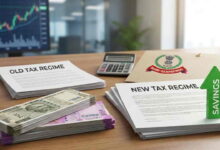Good News for Seniors! No Need to File ITR? New Rules for Income Tax Returns and Exemptions

Income Tax Return for Senior Citizens: Detailed information about the process of filing income tax returns and the available tax exemptions for senior citizens for the new Assessment Year 2025-26 is discussed here. This guide aims to help senior citizens understand income tax-related matters in a simple way.
Who are Senior Citizens?
According to the Income Tax Act, Indian resident individuals who were 60 years of age or older but less than 80 years of age at any time during the previous financial year are considered senior citizens. Those who are 80 years of age or older are referred to as Super Senior Citizens.
Key Tax Exemptions and Benefits:
- Exemption from Filing Income Tax Return (Section 194P): Senior citizens aged 75 years or more, who only have pension income and interest income from the same specified bank where they receive their pension, are not required to file an income tax return. In such cases, the bank will deduct the necessary tax.
- Higher Basic Exemption Limit: Senior citizens enjoy a higher basic tax exemption limit compared to general taxpayers. Special provisions are available for them under both the old and new tax regimes.
- Additional Deduction on Interest Income (Section 80TTB): Senior citizens can avail an income tax deduction of up to ₹50,000 per annum on interest income earned from deposits in banks or post offices.
- Deduction for Health Insurance Premium (Section 80D): Senior citizens can claim a deduction of up to ₹50,000 for health insurance premiums paid for themselves. If they are also paying for their parents (who might also be senior citizens), additional benefits may apply.
- Relief from Advance Tax Payment: Senior citizens who do not have any income from business or profession are not required to pay advance tax.
- Option for Paper Filing of ITR: Senior citizens can still choose to file their income tax returns (specifically ITR-1 Sahaj or ITR-4 Sugam) in paper form.
Applicable Income Tax Return (ITR) Forms:
Depending on their sources of income, the following ITR forms may be applicable to senior citizens:
- ITR-1 (Sahaj): This form is for resident individuals having a total income of up to ₹50 lakh from salary, one house property, other sources (like interest), and agricultural income up to ₹5,000.
- ITR-2: This form is for individuals and Hindu Undivided Families (HUFs) not having income from business or profession but who are not eligible for ITR-1 (e.g., having capital gains or income from more than one house property).
- ITR-3: This form is for individuals and HUFs having income from business or profession.
- ITR-4 (Sugam): This form is for individuals, HUFs, and Firms (other than LLPs) being a resident having total income up to ₹50 lakh and having income from business and profession which is computed under sections 44AD, 44ADA or 44AE.
Other Important Forms:
- Form 15H: This is a declaration that can be submitted by senior citizens to banks or other financial institutions to request non-deduction of TDS on certain incomes if their total income is below the taxable limit.
- Form 12BB: This form is used by salaried employees to declare their investments and claim tax deductions to their employer.
- Form 16/16A: These are TDS certificates. Form 16 is issued by employers for tax deducted on salary, and Form 16A is for tax deducted on other incomes.
- Form 26AS and Annual Information Statement (AIS): These are annual consolidated tax statements that show details of tax deducted/collected at source, advance tax paid, self-assessment tax payments, etc., against your PAN. It’s crucial to reconcile these with your income details before filing your return.
Conclusion:
It is highly important for senior citizens to be aware of the income tax rules and the benefits available to them. Proper planning and timely filing of income tax returns not only ensure compliance with the law but also contribute to maintaining financial stability. If there are any difficulties or doubts, seeking advice from a tax professional is always recommended.

